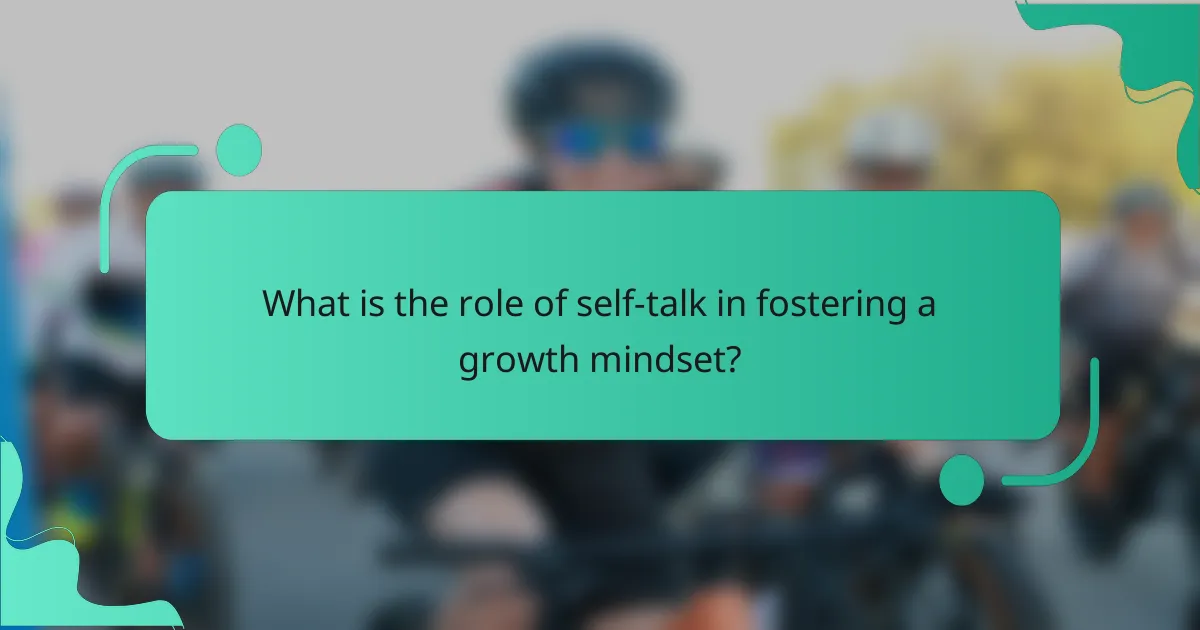Developing a growth mindset is essential for professional athletes to enhance performance and resilience. This article explores empowering self-talk strategies, including positive affirmations and reframing negative thoughts. It also highlights the importance of setting specific performance goals and incorporating visualization techniques. By implementing these strategies, athletes can cultivate a mindset conducive to continuous learning and improvement.

What is the role of self-talk in fostering a growth mindset?
Self-talk plays a crucial role in fostering a growth mindset by influencing athletes’ beliefs about their abilities. Empowering self-talk encourages resilience, enhances motivation, and supports continuous learning. Positive affirmations and constructive internal dialogue help athletes embrace challenges and view setbacks as opportunities for growth. By cultivating a habit of optimistic self-talk, athletes can improve performance and develop a more adaptive mindset.
How does positive self-talk influence athletic performance?
Positive self-talk significantly enhances athletic performance by boosting confidence and focus. Athletes who engage in constructive self-dialogue experience reduced anxiety and improved resilience. Research indicates that positive affirmations can lead to measurable performance gains, such as increased endurance and better execution of skills. By fostering a growth mindset through empowering self-talk strategies, athletes can unlock their full potential and maintain motivation during challenging moments.
What are the key components of effective inner dialogue?
Effective inner dialogue for professional athletes includes self-affirmation, constructive feedback, and goal-oriented thinking. These components foster a growth mindset essential for performance improvement. Self-affirmation boosts confidence, while constructive feedback allows athletes to learn from mistakes. Goal-oriented thinking keeps focus on progress and achievement. Emphasizing positive self-talk enhances resilience and motivation, crucial for overcoming challenges in competitive sports.
How can athletes identify negative self-talk patterns?
Athletes can identify negative self-talk patterns by recognizing specific phrases and thoughts that arise during challenges. Self-reflection is crucial; journaling experiences can reveal recurring negative statements. Monitoring emotional responses to these thoughts helps in understanding their impact. Seeking feedback from coaches or peers can provide additional insights into destructive self-talk. Finally, practicing mindfulness techniques can enhance awareness of negative patterns, allowing athletes to replace them with positive affirmations.
What strategies can replace negative thoughts with positive affirmations?
To replace negative thoughts with positive affirmations, professional athletes can practice specific self-talk strategies. These strategies include identifying negative thoughts, reframing them into positive statements, and consistently repeating affirmations to build resilience. Utilizing visualization techniques can also enhance the effectiveness of affirmations, allowing athletes to mentally embody success. Regular practice of these techniques fosters a growth mindset, empowering athletes to overcome mental barriers and perform at their best.

What universal attributes support a growth mindset?
A growth mindset is supported by attributes such as resilience, adaptability, and a focus on learning. These qualities enable professional athletes to embrace challenges, learn from feedback, and persist through setbacks. Resilience helps them recover quickly from failures, while adaptability allows them to adjust strategies in response to changing circumstances. A commitment to continuous learning fosters improvement and skill development, crucial for athletic success.
How does resilience contribute to a growth mindset?
Resilience significantly enhances a growth mindset by enabling individuals to view challenges as opportunities for learning. When professional athletes cultivate resilience, they develop the capacity to recover from setbacks, which reinforces their belief in personal growth. This mindset shift fosters a positive internal dialogue, empowering them to embrace difficulties rather than avoid them. Resilient athletes often exhibit unique attributes such as persistence and adaptability, which are essential for continuous improvement and success. As a result, resilience becomes a critical component in fostering a robust growth mindset.
What are the benefits of embracing challenges?
Embracing challenges fosters resilience and adaptability, crucial traits for professional athletes. It enhances problem-solving skills, leading to improved performance. Additionally, facing difficulties builds confidence, encouraging a growth mindset. Studies show that athletes who embrace challenges often achieve higher levels of success and satisfaction in their careers.
How can athletes cultivate a love for learning?
Athletes can cultivate a love for learning by embracing a growth mindset and practicing empowering self-talk strategies. This approach encourages resilience, curiosity, and a proactive attitude towards challenges.
To foster this mindset, athletes should engage in self-reflection to identify areas for improvement. Setting specific learning goals can guide their development. For instance, they can focus on mastering new techniques or understanding game strategies.
Incorporating positive affirmations into their daily routine can enhance self-belief and motivation. Athletes might say, “I am capable of learning and growing every day.” This reinforces their commitment to continuous improvement.
Additionally, seeking feedback from coaches and peers provides valuable insights. Constructive criticism helps athletes recognize their strengths and areas needing attention, further fueling their desire to learn.

What unique attributes enhance self-talk strategies for athletes?
Unique attributes that enhance self-talk strategies for athletes include personalization, contextual relevance, and emotional resonance. Personalization tailors affirmations to individual strengths and weaknesses, fostering deeper connection. Contextual relevance aligns self-talk with specific performance scenarios, enhancing focus. Emotional resonance invokes positive feelings, boosting motivation and resilience. These attributes collectively empower athletes to cultivate a growth mindset through effective self-talk strategies.
How can visualization techniques improve self-talk?
Visualization techniques can significantly enhance self-talk by creating positive mental imagery that reinforces confidence and motivation. These techniques allow professional athletes to mentally rehearse successful performances, which can lead to improved self-dialogue and resilience. For instance, visualizing overcoming challenges can transform negative self-talk into empowering affirmations. This approach fosters a growth mindset, enabling athletes to view setbacks as opportunities for development. Integrating visualization into daily routines can help solidify these positive self-talk strategies, ultimately enhancing performance and mental well-being.
What role does goal setting play in self-talk?
Goal setting enhances self-talk by providing direction and purpose. It allows athletes to create specific, measurable objectives that improve motivation and focus. For instance, setting a goal to improve a personal best time can foster positive self-talk, encouraging perseverance and resilience. Research shows that athletes who engage in goal setting experience increased confidence and reduced anxiety, leading to more effective self-talk strategies. This alignment between goals and self-talk cultivates a growth mindset, essential for peak performance.
What are SMART goals and how do they relate to self-talk?
SMART goals are specific, measurable, achievable, relevant, and time-bound objectives that enhance self-talk for professional athletes. Implementing SMART goals fosters a growth mindset, encouraging positive self-dialogue. This approach helps athletes focus on progress, build resilience, and maintain motivation. For example, setting a goal to improve sprint time by two seconds within three months allows for targeted self-talk that reinforces determination and accountability. By aligning self-talk with SMART goals, athletes can transform challenges into opportunities for growth.

What rare attributes can elevate self-talk for peak performance?
Rare attributes that can elevate self-talk for peak performance include visualization techniques, specific affirmations tailored to individual strengths, and the practice of gratitude. These elements enhance self-awareness and foster resilience. Visualization helps athletes mentally rehearse success, while personalized affirmations reinforce belief in abilities. Gratitude shifts focus from challenges to opportunities, promoting a positive mindset. Integrating these rare attributes into self-talk can significantly boost performance and confidence.
How can mindfulness practices enhance self-talk effectiveness?
Mindfulness practices can significantly enhance self-talk effectiveness by promoting awareness and reducing negative thought patterns. These practices help athletes develop a growth mindset, fostering resilience and positive self-affirmation. Techniques such as meditation and focused breathing can improve concentration and emotional regulation, leading to more constructive internal dialogues. As a result, athletes can replace self-doubt with confidence, ultimately enhancing performance.
What is the impact of team dynamics on individual self-talk?
Team dynamics significantly influence individual self-talk by shaping perceptions and attitudes. Positive interactions within a team foster supportive self-talk, while negative dynamics can lead to self-doubt. A growth mindset thrives in environments where feedback is constructive and collaboration is encouraged. This atmosphere promotes resilience and adaptive self-talk strategies, essential for professional athletes. As a result, athletes develop a strong sense of self-efficacy, enabling them to overcome challenges and enhance performance.

How can professional athletes implement self-talk strategies in their training?
Professional athletes can enhance their training by implementing self-talk strategies that promote a growth mindset. These strategies include using positive affirmations, reframing negative thoughts, and setting specific performance goals.
Positive affirmations help athletes build confidence and reinforce their abilities. For instance, repeating phrases like “I am strong” or “I can improve” can shift focus from doubt to empowerment. Reframing negative thoughts involves recognizing unproductive self-criticism and replacing it with constructive feedback. This can turn setbacks into learning opportunities.
Setting specific performance goals provides clear targets for athletes to aim for, fostering motivation and a sense of accomplishment. By regularly practicing these self-talk strategies, athletes can cultivate resilience and enhance their overall performance.
What are practical steps to integrate self-talk into daily routines?
Integrating self-talk into daily routines involves consistent practice and intentionality. Begin by setting specific times for positive affirmations, such as morning rituals or pre-competition routines. Use reminders to prompt self-talk sessions throughout the day. Incorporate self-talk into training by verbalizing thoughts during practice. Reflect on experiences and adjust self-talk strategies based on outcomes. Engage in journaling to track progress and reinforce positive narratives.
What common mistakes should athletes avoid when using self-talk?
Athletes should avoid negative self-talk, overgeneralization, and unrealistic expectations. These mistakes can hinder performance and growth. Negative self-talk can create self-doubt, while overgeneralization leads to a defeatist mindset. Unrealistic expectations can result in frustration and burnout. Instead, athletes should focus on constructive and specific affirmations to foster resilience and motivation.

What expert insights can optimize self-talk for performance enhancement?
To optimize self-talk for performance enhancement, athletes should focus on positive affirmations and constructive internal dialogue. These strategies foster a growth mindset, enhancing resilience and motivation.
Research indicates that self-talk can significantly influence performance. For instance, athletes who use positive self-talk experience reduced anxiety and improved focus. This unique attribute of self-talk serves as a powerful tool in high-pressure situations.
Incorporating specific phrases that reinforce confidence can enhance an athlete’s mental state. Techniques such as visualization combined with affirmations create a robust framework for success. As a result, athletes can unlock their full potential and achieve peak performance.
What best practices should athletes adopt for effective self-talk?
Athletes should adopt positive self-talk, set specific goals, and practice visualization for effective self-talk. These strategies enhance performance, build resilience, and foster a growth mindset. Positive affirmations can counter negative thoughts, while goal setting provides direction and motivation. Visualization creates mental scenarios that prepare athletes for competition, reinforcing confidence and focus.
